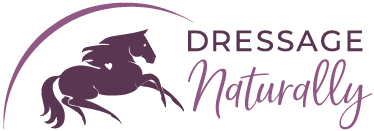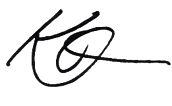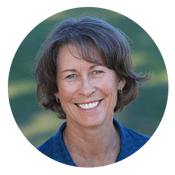Prefer to listen? Check out Karen's podcast on this subject.
On one of our weekly Q & A calls in the Sweet Spot of Healthy Biomechanics program, a student asked me: "What makes a rider a good rider? How do I know if I am a good rider when I am riding all by myself most of the time?" My answer surprised her a little, as she thought I would answer her with a checklist of movements that she would need to be able to perform. I did give her a list, but it was not of movements. Here is the list:
Qualities of a 'Good' Rider:
- Your horse understand you; your priority is clear communication
- You do your best to see things from your horse's perspective
- You don't act from ego
- You don't take your frustrations out on your horse
- You are able to follow that which you asked your horse to do
- Your horse sees you as trust-worthy
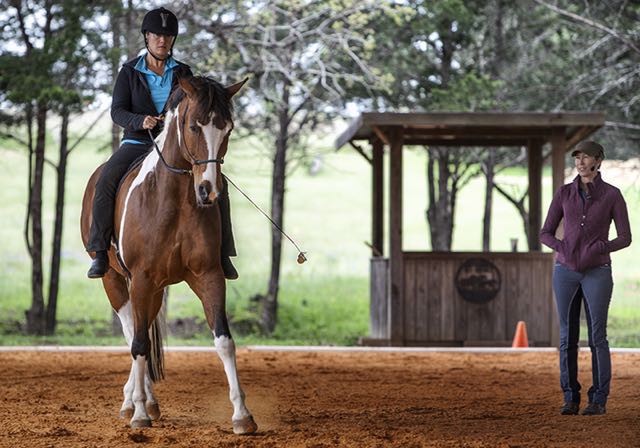
(Photo: Heidi Lowthorp and her horse, Q in a lesson with me. Credit: Monica Adams)
These qualities can appear at any level. You don't have to wait to Grand Prix to be a 'good rider'. There are plenty of educated and experienced riders who I would not call 'good riders' and there are plenty of 'good riders' that are not that educated or experienced.
When I thought about answering her question, the first thing I thought about was: How do I decide who can ride my own horses? I tend to be exceptionally greedy when it comes to my own horses… After coming from a land of lesson horses and sales horses and training horses it was just my little luxury and promise to myself (and my horses): I don't have to share my horses with anyone. But when I do put someone on one of my own horses they need to have the qualities on the list above. If I needed someone to exercise my horse, I would rather have a less educated rider with those qualities, than an upper level rider without them.
It reminds me a bit of the Object Of Dressage as written by the F.E.I (The international Equestrian Federation) which states:
The object of dressage is the development of the horse into a happy athlete through harmonious education resulting in a horse that is calm, loose, supple, and flexible, but also confident, attentive, and keen, thus achieving perfect understanding with his rider.
This object of dressage can also be met at the very beginning. It is possible for a lower level horse to meet the object of dressage and it is possible for a Grand Prix horse to not.
Of course, I am not saying that you can't have both. 'Good' riders can become educated, gain skills, and experience. Young supple, loose, confident, happy horses can be trained to become supple, loose, confident, happy Grand Prix horses. I have to believe that because if I didn't I would quit this!
The key is to not strive so hard to 'accomplish' and 'become' that you put your head down, push onward, only to look up years from now and think: 'What am I doing? What have I become? What have I created?'
For all the novice or amateur riders out there, remember that the most important judge of your riding is your horse. That is why I put understanding at the top of the list. With so many systems out there, at the end of the day, all your horse wants is to know what YOU are trying to say to him. He wants to know what to do, and he wants you to make it easy for him to do it. For all the experienced riders out there, remember that the most important judge of your riding is your horse… Not the score sheet, not the top rail of the jump. He just wants to know what you want him to do, and he wants you to make it easy for him to do it.
Strive for the qualities on the list above. Notice, however that it's not all woo woo stuff that can't be measured. You have to be able to follow that which you asked your horse to do. Riding is a physical skill and even if your main goal is harmony and understanding, there is a physical aspect that is important. Conflicting aids due to lack of balance or physical awareness can be just as devastating to the relationship as getting mad and frustrated. Know your abilities and play in that delicate balance of what you can do, and what you can't do yet. Don't be afraid of stretching your limits, but when you do, be mindful of how you handle your frustrations, and how the process is for your horse.
Making decisions with your horse based on the qualities above will keep you progressing in a way that you and your horse have a better chance of enjoying every step of it. And the best news is you can become a 'good rider' right NOW.
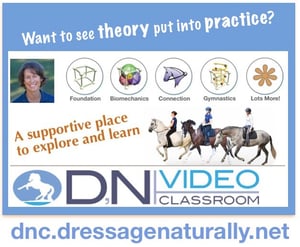 Take the 'Good' Rider Pledge:
Take the 'Good' Rider Pledge:
I pledge to communicate clearly so my horse understands me
I pledge to do my best to see things from my horse's perspective
I pledge to not act from ego, but instead from empathy and humbleness
I pledge to not take my frustrations out on my horse
I pledge to do my best to follow that which I asked my horse to do
I pledge to be trust-worthy to my horse
Thoughts? Scroll down to leave a comment!
